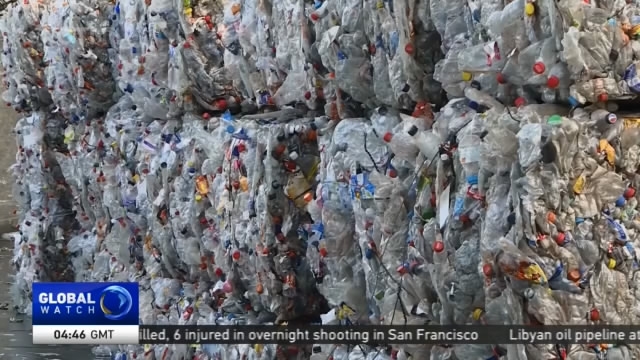
13:23, 22-Apr-2018
Plastic Pollution: Overproduction of the material needs a global solution
02:42

Research into the plastic leakage to the ocean often overlooks that this is just the last link of a global production chain involving not only developing countries, but also developed ones. Yang Zhao has more.
As of January 1st this year, China effectively banned imports of plastic recyclables and another 23 types of solid waste from other countries. The major policy shift announced the end of a huge business that China has used for decades to fill up its raw material shortage. In 2016, China took 51 percent of the 15 million tons of plastic recyclables in trade globally. This included 40 percent of US citizens' plastic recycling, as well as whopping percentages from Australia, the UK, and Japan.
The new policy has revealed a long existing fact that -- due to trade imbalances -- it's been much cheaper for western states to ship plastic waste abroad than deal with it themselves. The benefits of cheap, single-use products and packaging have been enjoyed around the globe, while the waste was sent to China and other parts of Asia.
Now China has shut the door to the waste, a wake-up call starts to ring for the West.
The US and other exporting developed countries will no doubt find new dumping grounds in South and Southeast Asia. This will have catastrophic consequences for these developing countries, who badly need the income but are not fully equipped to take on so much foreign waste. It will also result in more plastic leakage into the ocean.
But anti-pollution measures cannot address the elephant in the room -- global plastic production is out of control. Last year alone, the petrochemical industries in the US have invested 164 billion dollars in infrastructure and facilities to make more plastic. This will increase production capacity by a third within five years. Science magazine projects that 26 billion tons of plastic waste will be produced by 2050, four times more than we have ever had. What's worse, just 9% of plastics ever produced have been recycled.
Now China's ban on plastic waste imports could be a reminder for the global market that a bold solution to the plastic overproduction problem is badly needed. Experts called on developed countries to invest in developing ones to help them better manage the waste.

SITEMAP
Copyright © 2018 CGTN. Beijing ICP prepared NO.16065310-3
Copyright © 2018 CGTN. Beijing ICP prepared NO.16065310-3